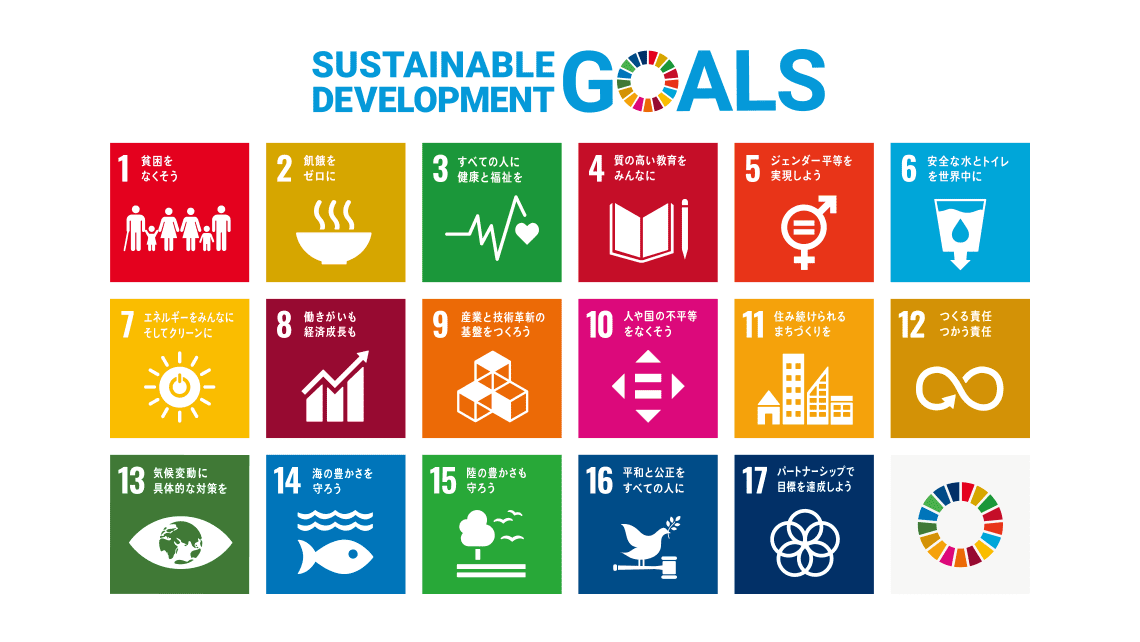
武蔵野大学SDGs実行宣言
私たち武蔵野大学は、2015年に国連サミットで採択されたSDGs(Sustainable Development Goals)、すなわち17の目標と169のターゲットからなる「持続可能な開発目標」の実行に向けて、すべての学生と教職員を挙げて全力で邁進することをここに宣言する。
本学は、1924年、関東大震災の翌年、深い悲しみ、苦しみのなかに、小さな光を灯すように、東京築地本願寺で産声を上げた。「いきとし生けるものが幸せになるために」という仏教の根源的願いは、2024 年に創立100周年を迎える武蔵野大学の生命線として脈々と受け継がれてきた。
その願いを今日的に具現化していくために、2016年、「世界の幸せをカタチにする。」(Creating Peace & Happiness for the World)をブランドステートメントとして宣言した。
このブランドステートメントの根底には、「世界は、幸せか。」という問いがある。
誰もが命をおびやかされることなく、平和に過ごせる世界にできないだろうか。誰ひとりとして、涙している人のいない世界にできないだろうか。生きているものぜんぶが、よりよくつながる世界にできないだろうか。このような問いに真摯に向き合い、感覚を研ぎ澄ませ、世界で起きていることを能動的に感じとり、感じ取った課題を解決するためには何をすべきか。互いに知恵を開き合い、一人ではできないことならば、価値観や言葉の境も超えて、異なる力を響き合わせ、世界の幸せをカタチにするために挑もう。在学生、同窓生、未来生、教職員、ブランドステートメントに共鳴するあらゆる個人や団体が力を合わせて、世界の幸せの響創者(Happiness Creator)として歩んでいきたい。これが武蔵野大学の決意である。
国連が採択した「我々の世界を変革する:持続可能な開発のための2030アジェンダ」には2030年までに、あらゆる貧困と飢餓に終止符を打つこと、国内的・国際的なあらゆる不平等と戦うこと、平和で、公正かつ包括的な社会をうち立てること、人権を保護しジェンダー平等と女性・女児の能力強化を進めること、地球と天然資源の永続的な保護を確保すること、持続可能で、包摂的な経済成長、共有された繁栄及び働きがいのある人間らしい仕事のための条件を作り出すことの決意が表明されている。
その上で、「この偉大な共同の旅に乗り出すにあたり、我々は誰も取り残さない」ことが誓われている。国連が取り組んでいるSDGsの「誰一人取り残さない」という基本理念と諸課題の実現とは、本学の「いきとし生けるものが幸せになるために」という根源的願い、「世界の幸せをカタチにする。」というブランドステートメントと軌を一にするものである。
武蔵野大学には、11学部、19学科、12研究科、24研究所・センターがある。私たちは、SDGs実行をここに宜言することによって、各学部・研究科・研究所においてSDGsの17 の目標のうち、それぞれが担当する領域に根ざした活動を意識的かつ具体的に行っていく。
同時に、ブランドステートメントの牽引役を担う「Musashino University Creating Happiness Incubation」 (しあわせ研究所) においては、SDGsの具体的実践とともに真の幸せとは何であるかという最奥部の問いに関する学問的探究も深めていきたい。
武蔵野大学は仏教精神に基づく大学であり、それは、単なる論説だけに終始するのではなく、人々の安寧と世界の幸福を求めて具体的な社会活動を実践していく精神にほかならない。象牙の塔にこもるのではなく、街に出て、現場に出て、人々や世界と直に接し、「世界の幸せをカタチにする。」を実現させていきたい。まことに、武蔵野大学SDGs実行宣言の核心はそうした実践にこそある。
2019年3月20日
国際幸福デー
武蔵野大学長 西本照真
※宣言当時の原文のため、現在の学部等の数と異なる場合があります。
Musashino University makes this Declaration that, from today, our students, academic staff and administrative staff will commit to advancing the 17 Sustainable Development Goals (and related 169 targets) announced as part of the 2015 United Nations Summit.
In 2024, Musashino University will celebrate its 100th Anniversary. Today it is a comprehensive university set across two campuses in Musashino City and in Ariake in Koto, Tokyo but its origins lie in the vision of our founder Dr Junjiro Takakusu who sought to establish a place of education in the aftermath of the Great Tokyo Earthquake of 1923. In 1924, as a way to offer a ray of light in a period of deep sadness and difficulty, the university commenced as a women’s school in Tsukuji Honganji, Tokyo with the Buddhist philosophy that ‘all beings, all living things may be happy’ underpinning its educational objectives. These educational principles have continued to the present day and in 2016, the University reasserted its mission to reflect its history and the future through the statement ‘Creating Peace and Happiness for the World’ (世界の幸せをカタチにする).
At the foundation of this statement is the question ‘Is the world, happy?’ (世界は、幸せか). It is there to encourage us to interrogate the meaning of ‘happy’, that people may live in a world without fear, that there are ways to live in a world of peace; that we may actively consider ways to ensure the happiness of all beings can be realized. We ask ourselves, ‘what should we do to grapple with these issues and how might we solve them?’ To this end, we encourage our students, our graduates, future students and our staff to consider themselves as ‘Happiness Creators’, that their association with Musashino University gives them the skills and knowledge to question existing thinking and values in ways that bring new meaning to challenges facing our world, now and into the future.
Since its early beginnings, Musashino University has grown to have 11 Faculties, 19 Departments, 12 Graduate Schools and 24 Research Centers. In addition, to reflect our educational commitment, we have established a research institute, the Musashino University Creating Happiness Incubation (しあわせ研究所) to encourage and promote interdisciplinary research across the University community. In declaring our support for the SDGs, each department, each faculty, each graduate school and every research center will proactively engage relevant SDGs as a part of teaching and research.
The UN’s 2030 Agenda, includes elimination of poverty and hunger, to realize a fair and just society for all, to preserve human rights and advance gender equality, especially for women and girls, and maintain sustainable use of the world’s natural resources. The UN SDGs program which aims to ensure that ‘no-one will be left behind’, and our University’s founding principle that ‘all beings, all living things may be happy’, thus form the basis for realising our University’s mission to create peace and happiness for the world, in a very practical sense, to which, we declare our commitment on this day, World Happiness Day.
Professor Teruma Nishimoto
President, Musashino University, Tokyo
20 March 2019
International Day of Happiness

